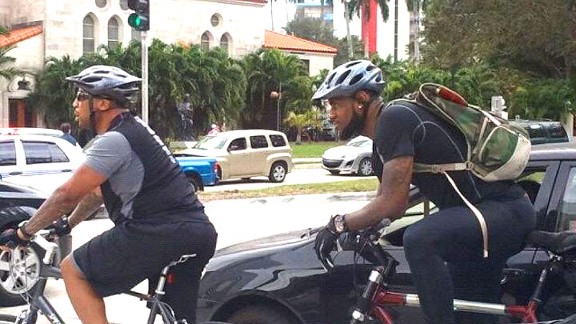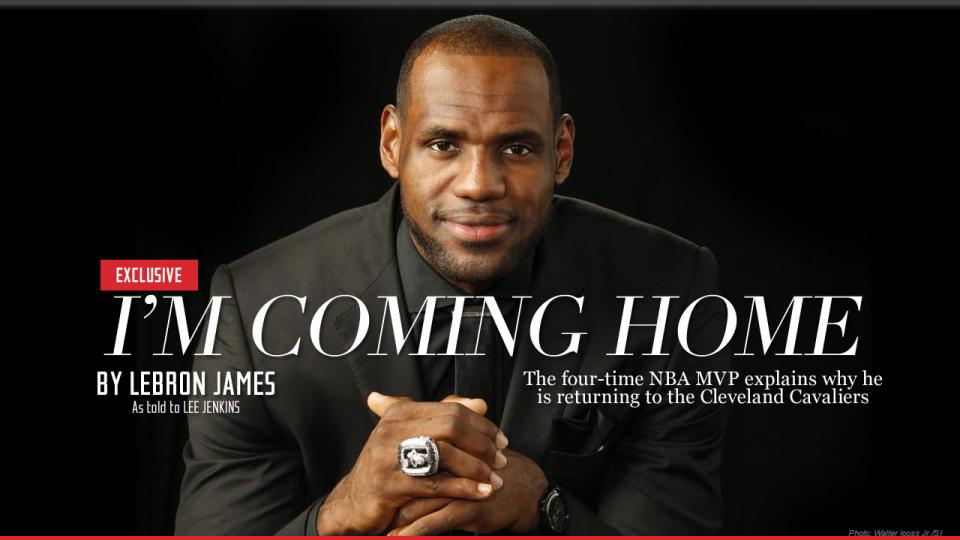LeBron James signs on to Team Strong Towns
LeBron James made world headlines this month when he explained, “My relationship with Northeast Ohio is bigger than basketball,” and announced his return to the Cleveland Cavaliers.
I got goosebumps.
LeBron has long been a philanthropic force and vocal advocate for his hometown, Akron. He has never forgotten about Ohio but whoa mama. This is cool.
Why is the LeBron frenzy relevant to Strong Towns readers?
- First, know that King James is a good influence. The man casually rides a bike (for transportation, not just a joy ride!) because of all the reasons cycling is a completely normal and sensible thing for people to do.
 Photo by Peter Lee, HotHotHoops.com
Photo by Peter Lee, HotHotHoops.com - One of the most powerful, savvy, and respected celebrity figures essentially just said it matters not just what you do, but where you do it. How very Strong Towns.
“I have a responsibility to lead, in more ways than one, and I take that very seriously. My presence can make a difference in Miami, but I think it can mean more where I’m from.”
- On top of that, this highlights the importance of a place being loveable enough in the first place to pull a LeBron back home. Being someone’s hometown isn’t enough - a place needs to foster gratitude, good memories, and a sense of reciprocity. For people like LeBron, it’s more satisfying to give back to a place than it is to always take and consume.
 Screenshot from James' exclusive Sports Illustrated Essay
Screenshot from James' exclusive Sports Illustrated Essay
This is a story to which many can relate. It’s about the wrenching decision of how far to follow a career away from home. It’s about cultivating a feeling of home at all. It’s about dedicating yourself to the betterment of a place regardless of the sacrifices and frustrations that might involve.
Since I started blogging about such matters at Another Place for Me, people have explained to me that they struggle with these feelings all the time. They ask themselves: Where do I want to call home? Where is it worth the inevitable challenges I’ll face trying to make a difference?
Context, obligation, and emotion makes migration a complicated thing. Ask someone why they live where they do and even the simple answers - “My family is here.” "Can't afford to move." “I found a job.” “I hate winter.” - can lead you down a rabbit hole of more why’s.
Given all of that complexity, how can a place understand its own flux in population? Last year, I started kneading this question into a completely unscientific theory (or model, I'm not sure what to call it). I'm going to go out on a limb here and share that. If it makes any sense, please help refine it. Here’s what I’ve got so far. Forgive the annoying labels - at a loss for anything better.
People on the move
In this concept of migration, let's imagine that people tend to be: Hunters, Gatherers, or Gardeners.
Depending on the beholder, places tend to be: in a food chain, or on a carousel.
Hunters
Hunters are nomadic. They will chase a goal wherever it takes them and view places on a food chain. Often, their career will have a necessary geographic dimension. For example, if one’s goal is to be a top hedge fund manager they work their way up the food chain to a financial capital like New York. Country superstar? Nashville. Top fashion designer? Milan or Paris.
Despite being nomadic, hunters can still contribute enormously to wherever they call home. By virtue of them being rich or famous or influential, they can put their hometown on the map, generate tourism interest, be an advocate, invest in a fancy second home, or what have you. For example, Stratford Ontario is not complaining that Justin Beiber graduated from busking on its streets to stardom in LA. Beibs needed to leave and Stratford has made a pretty penny just by being his hometown.
A hometown should not feel snubbed for being lower on the food chain. Sometimes a person must move elswehere to do their thing. And afterward, a triumphant hunter can either announce to the world, “I made it despite growing up in a backwater nowhere,” OR “I made it because I had so much hometown support in my humble beginnings.” Not everyone will be as forgiving as LeBron “Who am I to hold a grudge?“ James who remained proudly Akron even while people at home were burning his jersey in resentment of his move to chase championships.
Gatherers
Gatherers are semi-nomadic. They leave home to study, work, explore, or love elsewhere. Every time they move, they may bring with them people (ie. lovers and offspring), ideas, enthusiasm, wealth, and knowledge that they have gathered from elsewhere. This valuable group agitates and drives the improvement of a community because they don't have time to become complacent. They came, they saw, they called out everyone's excuses. Gatherers view places on a carousel. They can hop on and off anywhere around the carousel and may come full-circle right back to their hometown. For example, my parents met in a rural high school, moved around to Waterloo, Vancouver, Boston, Nashville, and Toronto working and studying, and then moved back no more than 3km away from the high school where they met. They made a home and raised a family there. For gatherers on the carousel, any number of factors could induce them to hop off and stay in a place but if they never feel at home, they could keep riding that thing forever.
If a gatherer does find a good place to hop off the carousel and dig in, they mature into a gardener.
Gardeners
Gardeners are sedentary. They stick around in a place for an extended period of time and perform the heavy lifting. They have a vital role: keep things running smoothly and protect the place from losing what makes it special. Commentor John Thomas gave a perfect explanation of gardening gone wrong in his own home: "Historically, Iowa City's main challenge has not been unemployment. It has been an inability to place sufficient value on what makes Iowa City charming and beautiful.”
Gardeners see places on a food chain too, and they are always keenly aware of whether or not their city is falling or climbing that food chain based on who they see coming and going. Maintaining gardener morale can be tough, so it’s helpful to have some dedicated cheerleaders in this group.
Still, gardeners can get hung up on losing all their ‘hunters.’ They sound the alarms when talented people leave or get poached by other cities. But a place should never be afraid of having too many hunters. Relatively few people are suited to permanent nomadism and eventually most get tired of the hunt and just want to go home, even if to retire. The focus should really be on making a place to which people want to return.
As we’ve seen with LeBron, if you can create a place that people love to call home, they will bend over backwards to live, work, and contribute in that place.
Bringing it all together
I’ve got a friend/mentor who I admire greatly. He explained to a group of us 20-somethings why he feels it’s important to have a personal attachment to a place. He wanted his kids to have somewhere that felt like home, rooted, and discovered what that felt like personally after a devastating injury. His community astounded him with kindness and generosity so he could recover and continue his hard work that was much appreciated locally. He’s the kind of guy that would be successful anywhere but he wants to be here where it matters more.
Just like it matters more to LeBron in Cleveland. Just like it matters to Gary Alexander and Siegel Clore in northeast Detroit, or Sarah Kendzior in St. Louis, or countless others who have made a choice to live, work and give like they care about a place.
This is a trend that will build stronger places. It is a trend that I believe will be bigger, louder, and happier with King James setting the standard from his throne of influence.
Where it matters most won’t always be a hometown. There are a lot of suburban kids like me that don’t really feel like they have a hometown. They had a house and a mall and an arterial road connecting the two. There are a lot of people riding the carousel looking for somewhere to contribute, somewhere that loves them back.
We've filled a graveyard with economic development policies that have failed to crack this nut. Business parks and a branding campaign do not a home make. LeBron didn’t come back for a tax perk. When it comes to choosing where to live, people who have any choice in the matter are not easily predictable "rational economic actors." Try calculating the utility of “It’s where I walked. It’s where I ran. It’s where I cried. It’s where I bled. It holds a special place in my heart.”
I don’t know how to make places that matter, places where we matter. The easier challenge is making places that people like, which is a good start. But I think every community should ask itself, “Do our LeBrons ever come back?” If the answer is no, then it’s time to do something different.
